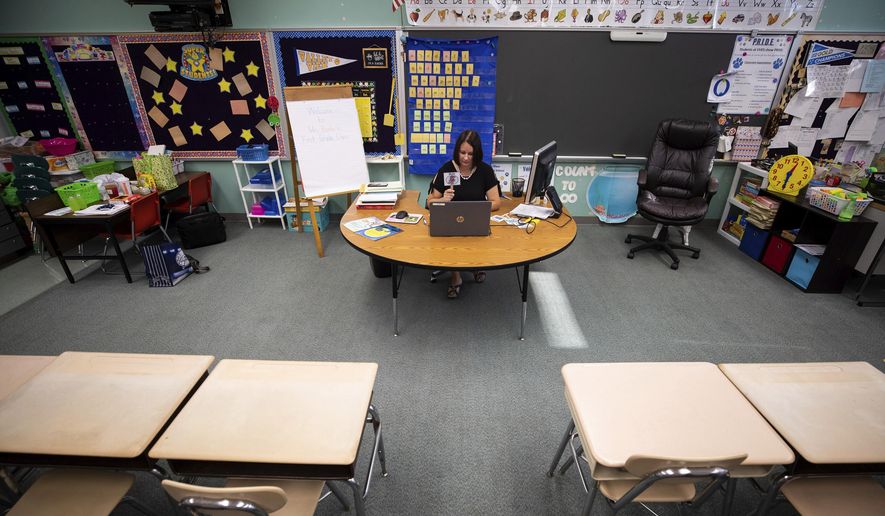Test scores in D.C. elementary and middle schools have declined under remote and hybrid learning arrangements, according to a new study from the nonprofit EmpowerK12.
The education data firm’s comparison of math and reading assessments for nearly 30,000 D.C. public and charter school students from spring 2021 found that Black and Latino students from poor families suffered the worst.
“Our research illuminates the disparate impact of the pandemic on the wellbeing and academic growth of Black and Brown students from low-income families,” Joshua Boots, the founder and executive director of EmpowerK12, told The Washington Times in an email Wednesday.
Mr. Boots added that pandemic losses and limited internet resources have made distance learning a particular challenge for these families.
“They were more likely to experience the trauma of losing a family member they love and less likely to have access to high-speed internet that allows them to successfully participate in distance learning,” he said.
The study adds to growing research showing American children struggling with math and reading skills after schools shifted from in-person to remote learning.
A widely cited study from McKinsey & Company estimates that U.S. students on average fell five months behind on math and four months behind on reading during the 2020-202l academic year.
More than a dozen such studies show that students have performed poorly in reading during the pandemic, the Seattle Times reported last week.
EmpowerK12’s analysis of D.C. scores showed fewer students from kindergarten to second grade reading at the appropriate level.
The share of students reading at their appropriate grade level dropped 27.4% for at-risk students and 25.1 percent for Black students from 2019 to 2021.
Students in second to eighth grade who took computer English Language Arts (ELA) standards and math tests also achieved at lower percentiles than two years ago.
Scores dropped 14.3% for at-risk students and 13.7% for Black students in ELA; they dropped 13.8% for at-risk students and 13.7% for Black students in math.
Students in third to eighth grade had three to four months of unfinished learning, the study found.
The study also found that “more time spent in-school receiving live instruction likely translated to improved academic growth, especially for students designated as at-risk.”
Paul Kihn, the city’s deputy mayor for education, said the report affirms Mayor Muriel Bowser’s emphasis on increased tutoring and mental health services during the pandemic.
“While a full return to in-person learning was the first and most important step to accelerate learning, Mayor Bowser has prioritized historic investments to provide high-impact tutoring and mental health services to all D.C. students,” Mr. Kihn said in a statement.
“These new, targeted supports are critical to our shared recovery and closing the widening opportunity gaps we are seeing in our schools,” he added.
The EmpowerK12 study did not include data from suburban Maryland and Virginia schools.
But the Virginia Department of Education reported in August that 2020-2021 scores dropped significantly in the commonwealth with pass rates of 69% for reading, 54% for mathematics and 59% for science assessments.
In Maryland, The Washington Post reported in February that the state “scaled back” standardized tests last spring amid the pandemic, giving only a handful of short math and English exams that cannot be compared to previous years.
In September, WTOP reported that 41% fewer of Maryland’s graduating seniors took the SAT in spring 2021, while 24% fewer Virginia seniors and 10% fewer D.C. seniors did so.
• Sean Salai can be reached at ssalai@washingtontimes.com.




Please read our comment policy before commenting.